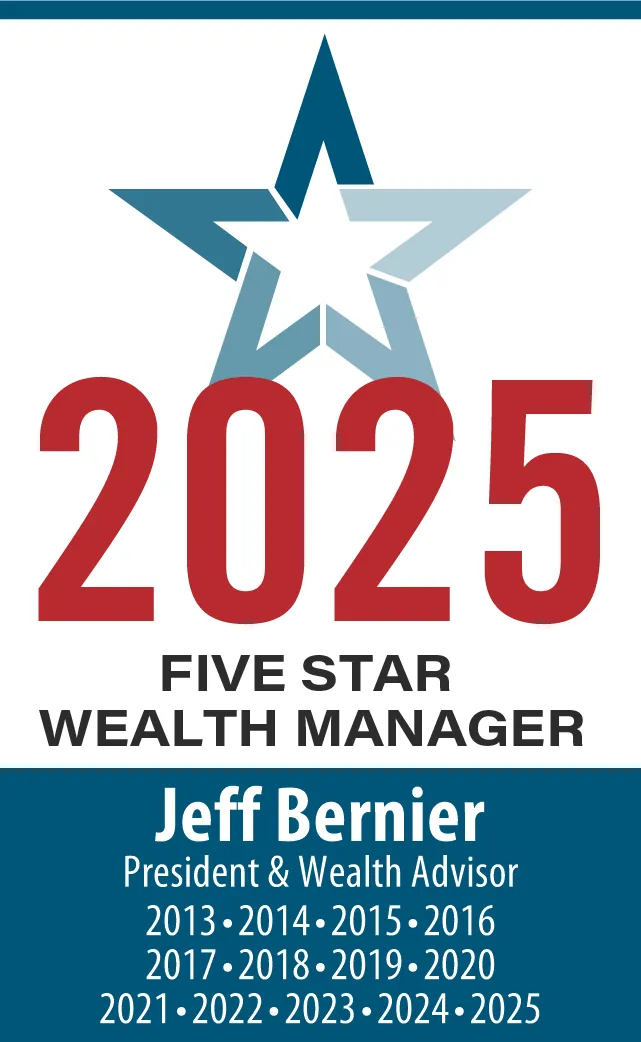
By Jeff Bernier, CFP®, ChFC, CFS
If you visited the gym this week, you may have noticed larger crowds than normal. Yes, it’s new year’s resolution season! The turning of the calendar is a time that many people make new commitments to themselves about all the things they are going to do differently in the new year.
While I don’t generally make resolutions for the new year, I love year end and the start of a new year. For over 35 years, I have taken time at the end of the year to reassess successes and failures from the previous year and to set new goals for the year ahead. This makes sense to me as one of my top 5 CliftonStrengths themes is “Strategic.”
I used to set goals in the key areas of my life: faith, family, health, career (purpose), finances, and fun. Some of these goals represented a bucket list I dreamed about for the next 1 year, 3 years, 5 years, 10 years, and my lifetime. I heard former football player and coach Lou Holtz speak once about a list of 107 lofty goals (ex. be a guest on The Tonight Show, have dinner at the White House, etc.) he came up with as an unemployed 28-year-old man and how, reflecting back many years later, he was surprised to realize he had accomplished most of the list. He was inspired to write the list after reading The Magic of Thinking Big by David J. Schwarz. After reading the book, he realized writing down goals that truly mattered, would spur him to find a way to achieve them.
Some time ago I read the classic Psycho-Cybernetics by Maxwell Maltz. The book explains how our subconscious goes to work on whatever target we set for it. Many of the psychological methods used to train elite athletes are actually based on Psycho-Cybernetics. Malz teaches that positive results come from a “positive goal focus.”
As I have matured in the process, I have determined that instead of setting many goals, I find it helpful to set fewer goals – often just one key goal in each area. You might call these fewer more important goals drivers. What is one key goal, that if accomplished, many other smaller goals are likely to be achieved?
I find that the process of annually re-evaluating and setting goals is incredibly motivating. While I certainly do not accomplish all of my goals, I feel sure that I make much more progress in the things that matter than if I blindly just do what “feels” good. As such, goals are useless without plans. While a goal can be aspirational, they are useless without a plan and process. I am reminded of a quote that I cited in my book The Money and Meaning Journey from sculptor Elizabeth King: “Process saves us from the poverty of our intentions.”
For me, breaking a goal down to weekly and daily activities is key. I now believe that these daily activities and habits are more important than the goals themselves. That is essentially the theme in Joshua Metcalf’s Burn Your Goals and James Clear’s best seller, Atomic Habits.
The character of a life is not set in two or three dramatic moments, but in ten thousand little moments. The character that is formed in those little moments shapes how we respond to big moments in life.
New Morning Mercies, Paul David Tripp
Armed with powerful goals and a set of daily activities that move you in the direction of your goals, your success is assured. Yeah, right! Life and other distractions get in the way. Like boxer Mike Tyson once said, “everyone has a plan until they get punched in the mouth.”
Three important lessons I have learned from years of year-end planning:
-
- What matters more than goals are values. What truly matters. If you don’t spend the time uncovering what really matters, and setting goals and activities that are congruent with your values and your “why”, you are unlikely to stick with them – and even if you did, they are not who you really are. Goals and plans can change – your values probably should not.
- It is easy to get caught up in an achievement and goal attainment mindset and lose focus on the gift of the present moment. When this happens, it is easy to focus more on accomplishments and things and less on people and being present.
- Celebrate progress not perfection. Evaluate and review all you’ve accomplished compared to your past – not some ideal that may not be attainable. Learn from past challenges and things you could have done differently but don’t obsess about them.
Past and future veil God from our sight; burn up both of them with fire.
Rumi
If you set for yourself a goal and work toward it, you are using clock time. You are aware of where you want to go, but you honor and give your fullest attention to the step that you are taking at this moment.
The Power of Now, Eckart Tolle
A new year is a good time to re-evaluate and set new goals and establish new habits – consistent with your values. It is always a good time to gain clarity on your values and your Why!
If you haven’t already, check out my book The Money and Meaning Journey to learn how to use your wealth to benefit your life, your family, and your surrounding community: bit.ly/3T9lEkR.
Important Disclosures: bit.ly/3MbScI5






